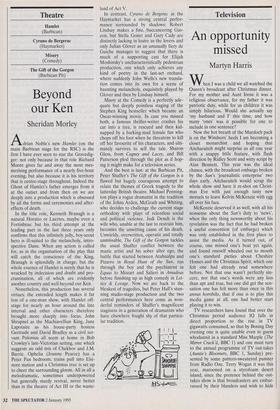Theatre
Hamlet (Barbican) Cyrano de Bergerac (Haymarket)
Misery (Comedy)
The Gift of the Gorgon (Barbican Pit)
Beyond our Ken
Sheridan Morley
Adrian Noble's new Hamlet (on the main Barbican stage for the RSC) is the first I have ever seen to star the Gravedig- ger: not only because in that role Richard Moore gives far and away the most mes- merising performance of a nearly five-hour evening, but also because it is his territory that is centre-stage throughout. Indeed the Ghost of Hamlet's father emerges from it at the outset and from then on we are deeply into a production which is obsessed by all the forms and ceremonies and after- effects of death.
In the title role, Kenneth Branagh is a natural Horatio or Laertes, maybe even a Fortinbras: but his third attempt at the leading part in the last three years only confirms that this infinitely jolly, boy-scout hero is ill-suited to the melancholy, intro- spective Dane. When any action is called for, as in the organisation of the play that will catch the conscience of the King, Branagh is splendidly in charge; but the whole essence of Hamlet is surely that he is wracked by indecision and doubt and pro- crastination, all of which are evidently another country and well beyond our Ken.
Nonetheless, this production has several virtues: the extended length makes it far less of a one-man show, with Hamlet off- stage for nearly an hour around the late interval and other characters therefore brought more sharply into focus. John Shrapnel as the Machiavellian King, Jane Lapotaire as his house-party hostess Gertrude and David Bradley as a civil ser- vant Polonius all seem at home in Bob Crowley's late-Victorian setting, one which suggests an odd mix of Chekhov and J.M. Barrie. Ophelia (Joanne Pearce) has a Peter Pan bedroom; trains pull into Elsi- nore station and a Christmas tree is set up to cheer the surrounding gloom. All in all a melodramatic, sometimes underpowered but generally sturdy revival, never better than in the theatre of Act III or the waste-
land of Act V.
In contrast, Cyrano de Bergerac at the Haymarket has a strong central perfor- mance surrounded by shadows: Robert Lindsay makes a fine, buccaneering Gas- con, but Stella Gonet and Gary Cady are distinctly lacking in lustre as the lovers and only Julian Glover as an unusually fiery de Guiche manages to suggest that there is much of a supporting cast for Elijah Moshinsky's uncharacteristically pedestrian production, one which only achieves any kind of poetry in the last-act orchard, where suddenly John Wells's new transla- tion comes into its own for a scene of haunting melancholy, exquisitely played by Glover and then by Lindsay himself.
Misery at the Comedy is a perfectly ade- quate but deeply pointless staging of the Stephen King bestseller which became an Oscar-winning movie. In case you missed both, a famous thriller-writer crashes his car into a tree, is rescued and then kid- napped by a barking-mad female fan who chops off his foot when he threatens to kill off her favourite of his characters, and ulti- mately survives to sell the tale. Sharon Gless, from Cagney and Lacey, and Bill Patterson plod through the plot as if hop- ing it might make for a television series.
And the best is last: at the Barbican Pit, Peter Shaffer's The Gift of the Gorgon is a flawed but hugely courageous attempt to relate the themes of Greek tragedy to the latterday British theatre. Michael Penning- ton plays a rogue dramatist in the tradition of the Johns Arden, McGrath and Whiting, who decides to challenge the current stage orthodoxy with plays of relentless social and political violence. Judi Dench is the wife who, unable at the last to restrain him, becomes the unwitting cause of his death. Unwieldy, overwritten, operatic and totally unmissable, The Gift of the Gorgon tackles the usual Shaffer conflict between the manic artist and his sober alter ego, the battle that started between Atahualpa and Pizarro in Royal Hunt of the Sun, ran through the boy and the psychiatrist in Equus to Mozart and Salieri in Amadeus before finishing up as high comedy in Let- tice & Lovage. Now we are back to the bleakest of tragedies, but Peter Hall's stun- ning studio-stage production and the two central performances here come as won- derful reminders of Shaffer's magnificent staginess in a generation of dramatists who have elsewhere fought shy of that particu- lar tradition.










































 Previous page
Previous page